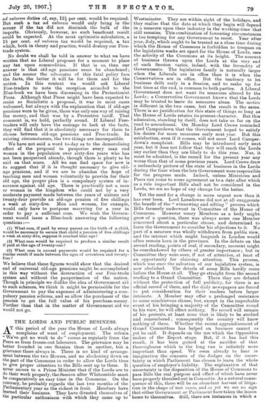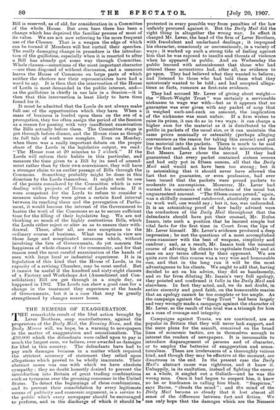THE LORDS AND PUBLIC BUSINESS. Westminster. They are within sight
of the holidays, and they realise that the date at which they begin will depend in a measure upon their industry in the working-time that still remains. This combination of favouring circumstances is too tempting for any Government to resist. Year after year, July, which ought to be treated as a close time during which the House of Commons is forbidden to trespass on the legislative weeks set apart for the House of Lords, sees the activity of the Commons at its height. The amount of business thrown upon the Lords at the very end of each Session varies, indeed, with the fecundity of Governments. The legislative family is naturally larger when the Liberals are in office than it is when the Conservatives are in office. But the tendency to let business drift early in a Session, and to make up for lost time at the end, is common to both parties. A Liberal Government does not want its measures altered by the Lords ; a Conservative Government knows that the Lords may be trusted to leave its measures alone. The motive is different in the two cases, but the result is the same. There is no justification for this state of things so long as the House of Lords retains its present character. But this admission, standing by itself, does not take us far on the road to amendment. On Monday Lord Crewe reminded Lord Camperdown that the Government hoped to satisfy his desire for more measures early next year. But this satisfaction, even if it comes, will not meet Lord Camper- down's complaint. Bills may be introduced early next year, but it does not follow that they will reach the Lords any earlier than they are likely to do this year. Nor, it must be admitted, is the record for the present year any worse than that of some previous years. Lord Crewe drew a melancholy picture of the state of business in the Lords during the time when the late Government were responsible for the progress made. Indeed, unless Ministries and Peers can come to some agreement as to a, date after which as a rule important Bills shall not be considered in the Lords, we see no hope of any change for the better.
Yet the need for a change is more urgent now than it has ever been. Lord Lansdowne did not at all exaggerate the benefit of the " winnowing and sifting" process which Bills formerly underwent in Committee of the House of Commons. However weary Members as a body might grow of a question, there was always some one Member concerned about a particular clause, and determined to force the Government to consider his objections to it. No part of a measure was wholly withdrawn from public view, and the interest which might languish in London would often remain keen in the provinces. In the debate on the second reading, points of real, if secondary, moment might be overshadowed by others of greater importance ; but in Committee they were sure, if not of attention, at least of an opportunity for claiming attention. This process, which was once the salvation of our legislative system, is now abolished. The details of some Bills hardly come before the House at all. They go straight from the second reading to a Grand Committee. There they are debated without the protection of full publicity, for there is no official record of them, and the daily newspapers are forced to put consideration for their readers before larger interests. A Member may offer a prolonged resistance to some mischievous clause, but, except in the improbable event of his bringing a majority of the Committee round to his view, he will effect nothing. No record will remain of his protests, at least none that is likely to be studied and remembered ; consequently the country will know nothing of them. Whether the recent aggrandisement of Grand Committees has helped on business cannot . as yet be said. It depends on the use which the Opposition makes of the Report stage. But, if it has had this result, it has been gained at the sacrifice of that thoroughness which in the long run is infinitely more important than speed. We seem already to hear in imagination the censures of the Judges on the uncer- tainty in which Parliament has chosen to leave the whole question of employer's liability. The explanation of that uncertainty is the disposition of the House of Commons to pass Bills the real purpose and effect of which have never been properly threshed out in Cominitte. As a natural conse- quence of this, there will be an abundant harvest of litiga- tion in the shape of test cases, and as yet we see no sign that either Government or Parliament have taken the lesson home to themselves. Still, there are instances in which a Bill is reserved, as of old, for consideration in a Committee of the whole House. But even here there has been a change which has deprived the familiar process of most of its value. We are not now referring to the more frequent use of the Closure. That is a weapon the edge of which can be turned if Members will but curtail their speeches. The really damaging change in procedure is the introduc- tion of the guillotine, especially when it is resorted to after a Bill has already got some way through Committee. 1Vhole clauses—sometimes of the most important character —are then disposed of without discussion, and a measure leaves the House of Commons on large parts of which neither the electors nor their representatives have had a word to say. It is then that the intervention of the House of Lords is most demanded in the public interest, and— as the guillotine is chiefly in use late in a Session—it is then that this intervention is least likely to have time found for it.
It must be admitted that the Lords do not always make full use of the opportunities which they have. When a mass of business is hurled upon them on the eve of a prorogation, they too often assign the period of the Session as a reason for passing with very insufficient examination the Bills actually before them. The Committee stage is got through before dinner, and the House rises as though its full tale of work were complete. Even on Monday, when there was a really important debate on the proper share of the Lords in the legislative output, we read: "The House rose at 20 minutes to 7 o'clock." If the Lords will reform their habits in this particular, and measure the time given to a Bill by its need of amend- ment rather than by their own convenience, they will have a stronger claim to an earlier passage of Bills through the Commons. Something probably might be done in this direction by the Lords themselves. It might well be one of the points considered by the Committee which is now dealing with projects of House of Lords reform. If it were competent for the Lords to refuse to consider a measure unless they were given a certain fixed interval between its reaching them and the prorogation of Parlia- ment, it would become the interest of the Government to hasten the work of the Commons so as to secure sufficient time for the filling of their legislative bag. We are not thinking so much of the highly contentious Bills, which the Lords either reject or alter so as to ensure their with- drawal. These, after all, are rare exceptions to the ordinary course of business. What we have in view are those large and complicated measures which, without involving the fate of Governments, do yet concern the happiness of whole classes of the community, and for that reason need the most careful examination at the hands of men with large local or industrial experience. It is in legislation of this kind that the House of Lords, in its capacity of a revising Chamber, may be most useful. But it cannot be useful if the hundred and sixty-eight clauses of a Factory and Workshops Act (Amendment and Con- solidation) Bill are got through in a single day, as happened in 1902. The Lords can show a good case for a change in the treatment they experience at the hands of Governments, but it is a case that may be greatly strengthened by changes nearer home.







































 Previous page
Previous page